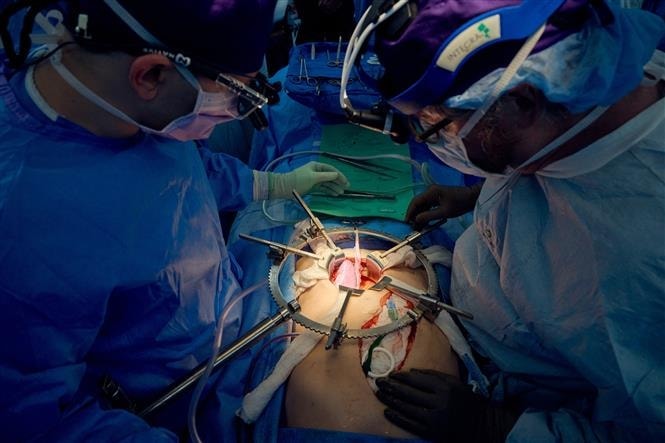Towana Looney from Alabama (USA) became the only person in the world who continued to live a normal life 61 days after receiving a gene-edited pig organ transplant.

The woman passed the milestone on January 26 when she became the longest-living recipient of a pig organ transplant. The pig organs in her body are still functioning normally after more than 2 months of transplant. This is considered a new record in the global medical industry.
About a month ago, Towana Looney, 53, was said to be recovering well after a transplant of genetically modified pig kidneys at NYU Langone Transplant Institute on November 25, 2025, which helped her escape 8 years of dialysis. This is the latest attempt to save lives with animal organs. Looney is the 5th American to receive a transplant of genetically modified pig organs.
"I'm Superman. It's a new perspective on life," Towana Looney said in a smiling interview after being able to outpace her family members on walks around New York City.
Ms. Looney's dramatic recovery is a morale booster for the scientific team's efforts to make animal-to-human organ transplants a reality.
"If you saw her on the street, you wouldn't know that she's the only person in the world walking around with a functioning pig organ inside her," said Dr. Robert Montgomery of New York University's Langone Transplant Institute, who led the transplant.
Dr. Montgomery assessed Ms. Looney's kidney function as "completely normal." Doctors hope she will be able to leave New York and return home to Gadsden, Alabama, in about a month.
“We are quite optimistic that this solution will continue to be effective and work well for a considerable period of time,” he said.
Why scientists use pig organs for transplants
Scientists have taken steps to genetically modify pigs to have organs that closely resemble those of humans, thereby solving the serious shortage of organs for human transplants. Currently in the United States, it is estimated that more than 100,000 people are on the transplant waiting list. Most of these people need kidney transplants, and thousands have died while waiting.
To date, pig organ transplants in humans have been deemed humane. The US Food and Drug Administration only allows them in exceptional cases, for people who have no other options.
“What Ms. Looney has achieved is an incredibly valuable experience,” said Dr. Tatsuo Kawai of Massachusetts General Hospital, who led the world’s first pig kidney transplant last year. Mr. Kawai noted that Ms. Looney is much healthier than previous patients and that this opens up new opportunities for future transplant trials.
Towana Looney's Transplant Story
Looney donated a kidney to her mother in 1999. However, complications during pregnancy caused high blood pressure, which caused Looney's remaining kidney to fail. This required her to undergo dialysis for eight years. Doctors later concluded that she would never receive another kidney from another person because her body had developed unusually high levels of antibodies that would attack and reject a foreign organ. So Looney turned to experiments with genetically modified pig organs in humans.
Discharged from the hospital just 11 days after her November 25 surgery, Dr. Montgomery’s team closely monitored her recovery through blood tests and other measurements. About three weeks after the transplant, they detected signs that rejection was beginning. However, the team built on previous failed studies to develop a successful treatment. And since then, Looney’s body has shown no signs of rejection.
For her part, Looney is also trying to help those who are contacting her via social media, sharing their pain as they continue to wait for organ transplants and answering questions about genetically modified pig kidneys.
During the conversation, Ms. Looney learned that a person was being considered for an animal organ transplant at another hospital but was quite hesitant and fearful about whether to proceed. She said: "I don't want to convince him to do it or not to do it." Instead, she advised the person to trust and follow his heart because she thought that was the best advice at this time.
Currently, there is no way to predict exactly how long Ms. Looney’s new kidney will last. If it fails, she may need to go back on dialysis again.
“The truth is we don’t really know what the next hurdles are because this is the first time we’ve gotten this far,” Dr. Montgomery said. “We’ll have to continue to monitor her closely.”